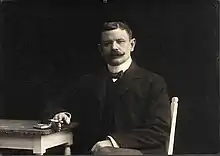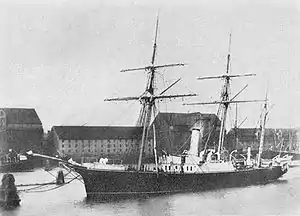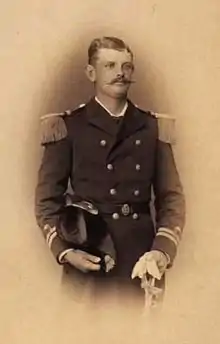Walter Christmas
Walter Christmas (born Walter Christmas-Dirckinck-Holmfeld) was a Danish author who is best known for his children's books. He also wrote novels, nonfictional accounts, and theatrical works.
Walter Christmas | |
|---|---|
 1902 | |
| Born | Walter Christmas-Dircknick-Holmfeld February 10, 1861 |
| Died | March 18, 1924 (aged 63) Copenhagen, Denmark |
| Burial place | Garrison Cemetery, Copenhagen |
| Citizenship | Denmark |
| Occupation | Author |
| Awards | Order of the Dannebrog |
| Espionage activity | |
| Agency | MI6 |
Alongside his writing, Christmas had a significant military career, serving in the Danish Navy, Royal Thai Navy, and the Greek Navy. He was decorated as a member of the Order of the Dannebrog for his military service and diplomatic efforts. In the later part of his life he was also an agent for MI6.
Personal life
Christmas was born on February 10, 1861 in Jægersborg. He was the son of Walter Edmund Christmas-Dirckinck-Holmfeld (1834–1916) a chamberlain and hofjægermester. His mother, Tusky Susanne Charlotte Christmas-Dirckinck-Holmfeld (1839–1924), was born the baronesse of the Dirckinck-Holmfeld noble family. In 1880, he legally changed his name from Walter Dirckinck-Holmfeld-Christmas to Walter Christmas.
On July 29, 1886 Christmas married Ragnhild Jutta Aja Weber in Svendborg. She was the daughter of wholesale merchant Theobald Weber. Walter and Ragnhild took several trips to the West Indies and South America during their marriage. Their daughter Aja Sigrid Ellen Christmas-Dirkinck-Holmfeld was born in 1887. Walter and Ragnhild divorced in 1898, and he was remarried to Ellen Margrethe Vilhelmine Owen née Hansen.[1] Ellen was born in 1872 and was the adoptive daughter of the merchant Ludvig Hansen and his wife.[2]
He died March 18, 1924 and is buried at Garrison Cemetery in Copenhagen.[3]
Military career

Christmas joined the Danish navy as a cadet at the age of 14. In 1883, he was appointed as a lieutenant, and the next year he was promoted to the rank of senior lieutenant. In 1885, Christmas was a member of J.A.D. Jensen's expedition to Greenland on board the steam gunboat Fylla.[4] In 1890 he traveled along the Amazon River with the intention of establishing a Danish shipping route. However, he was unable to find an investor in his project and the route was instead taken over by German shipowners.[5]
He again left Denmark in 1891 and traveled to Thailand, then the Rattanakosin Kingdom, where he was a Commander in the Siam Navy on behalf of the Danish navy. While the Danish crown was actively supporting the prevailing government of Siam, they were unwilling to be involved in a war with France in order to defend the nation. As such, Christmas in particular received a telegram from the Danish Ministry of the Interior that if he engaged in combat he would be discharged from the navy. He was the only Danish officer in Siam to receive such a warning. The navy eventually became involved in the Franco-Siamese War and in 1893, under Andreas du Plessis de Richelieu, he fought against the French navy during the Paknam incident. As a result of his engagement in the conflict, Christmas was discharged from the navy and recalled to Denmark. In his defence, he sent the ministry of the Danish Navy a report containing "some minor criticisms" of their presence in Siam. This report was then widely distributed to the public in a 1893 publication of Nationaltidende. The report argued that although there had been armed conflict, the Paknam incident did not constitute a war, and thus he had not disobeyed his orders. There is speculation that several other articles in various publications which criticized the Navy in Siam may have also written by Christmas.[5] His book about his experience, A year in Siam (Danish: Et år i Siam), was published in 1894.

After being discharged from the Danish Navy, Christmas joined the Greek Navy in 1895. While enlisted, he was involved in the Greco-Turkish War of 1897. He left the Greek Navy and returned to Denmark in 1897.[6]
Beginning in 1896, Christmas was involved in several attempts to sell the Danish West Indies to the United Kingdom, Germany, and ultimately the United States.[7] He had a familiarity with the islands through his grandfather, John Christmas, who had been governor-general of the Danish West Indies from 1871 until his death in 1873. Christmas unsuccessfully attempted to sell the Islands to Germany in collaboration with Rear Admiral Zirzow in December 1898.[8] He was later in contact with U.S. Secretary of State John Hay and President William McKinley as part of long standing negotiations to sell the islands to the United States.[9][10] Christmas was eventually accused of bribing U.S. officials and politicians. A committee was appointed by the Speaker of the House which held several hearings, though it ultimately acquitted Christmas. These allegations against him arose from the financial gains Christmas stood to make from a successful deal between the nations, as he had expected a commission of 10% on the sale price.[11][12]
Christmas rejoined the Danish Navy in 1914 at the rank of Captain, but was forced to resign in 1916 due to complications with severe rheumatism.[13] That same year he was inducted as a member of the Order of the Dannebrog.
Agent for MI6
For an undisclosed period of time, Christmas was an agent for the British Intelligence Service under the direction of Mansfield Cumming. Historian Keith Jeffery, who had been given access to MI6's records, wrote that while he was an officer of the Danish Navy, Walter Christmas had forwarded naval reports from Skagen to an MI6 contact in Copenhagen. He had been stationed in Skagen from 1914 until 1916.[1] His identity was eventually revealed by the woman he had used as a go-between, and Christmas was forced to flee to London.[14]
While in Greece, Christmas claims to have been in close contact with King George I of Greece, about whom he wrote the biography King George of Greece (Danish: Kong Georg I, Prins af Danmark). According to Christmas, the King's final words were "Thank God, Christmas can now finish his work with a chapter to the glory of Greece, of the Crown Prince and of the Army."[15] This was apparently in reference to Christmas' work as the King's personal biographer. The head of the MI6 station in Athens, Compton Mackenzie, wrote in his memoir Greek Memories of his encounters with Christmas:
"...a fantastic half-pay Danish sea-captain turned up in Athens with credentials from Alexandria. I was instructed to give him every facility to look round and also to let him send telegrams in our cipher under the name of Brutus. His real name was Christmas! He actually secured an audience of the King and immediately afterwards telegraphed to London a ridiculous account of the situation in Athens which I 5 who was not allowed to communicate directly with London, could only counter by a telegram of protest to Alexandria. On top of this he discovered all by himself a supposed submarine base at Laurium, and once again this wretched nonsense was disseminated in telegrams. Finally Sir Francis protested against this irresponsible old man of the sea’s sojourn any longer in Athens at the expense of the British Government, and he wandered off again. To look back after twenty-three years at Captain Christmas is to make me as skeptical of his real existence as of the existence of Santa Claus. Indeed, if I did not possess references to him in letters I should fancy that I had read about him in Hans Andersen’s fairy tales."[16]
Authorship
Walter Christmas published approximately 30 plays, novels, and short-stories in addition to a biography and series of memoirs. He published his first book in 1892 while in Thailand, titled Amazonfloden, erindringer og skildringer (English: Amazon River, memories and depictions) about his journey on the Amazon river. In 1901, Christmas released the first of five books about his character Peder Most, a young boy from Svendborg who embarks on worldly adventures. The resulting series became one of his most profitable successes. Though the books were very popular at the time they were released, they have since been criticized for their use of derogatory terms, ethnic slurs, and exoticism.[17]
Christmas is credited with popularizing Arthur Conan Doyle's Sherlock Holmes in Denmark. He had seen William Gillette's production Sherlock Holmes several times in 1899 while attempting to sell the Danish West Indies to the United States. He took extensive notes on Gillette's production which he then largely copied and reproduced in Denmark under the same title. Christmas' production of Sherlock Holmes debuted in 1901 in Copenhagen and was soon taken up by traveling acts which toured Denmark for several years. These traveling acts paid him for performance rights, despite the reality that the play was a copy of Gillette's, for which Christmas never gave him credit.[18] Danish intellectual property laws of the time initially took no issue with this obvious case of piracy, though by 1903 Denmark had signed the Berne Convention and Christmas was forced to become more cautious.[19][20]
Two of his original plays have been performed at the Royal Danish Theatre: "Skærsild" from 1906 and "Lige for Lige" from 1923.[7] In 1909 and 1910 Christmas was the director of Dagmarteatret, a theatre in Copenhagen. Under his direction the theatre came into conflict with the press over whether or not they should be allowed to photograph and print images of the theatre's productions. In retaliation, all reviews of the theatre's productions were halted in all Copenhagen news publications. This conflict with the press and financial difficulties led to Christmas' resignation.[21]
Selected bibliography
All of Christmas' works were originally published by Gyldendal, with the exception of Fejl Kurs, a novel manuscript which was posthumously published by Hasselbalchs Forlag.
- Amazonfloden, Erindringer og skildringer, 1892
- Et Aar i Siam, 1894
- Maïma: Novellistiske Forsøg, 1895
- Kærlighedens ret, 1895
- Sherlock Holmes, 1901
- Peder Most, 1901
- Frits Banner, 1902
- Fremtidslande, 1903
- Styrmand Most, (Peder Most series) 1903
- Kong Peder, (Peder Most series) 1904
- En lektion: Komedie i fire Akter, 1905
- På Livet løs, (Peder Most series) 1906
- Skærsild: Skuespile i fire Akter 1906
- Smaa Helte, 1907
- Guldminen Malibran, 1908
- Rivaler: Lystspil i fire Akter, 1908
- Eventyrblomstren, 1909
- Millionærdrengen, 1909
- Under Tropesol, 1909
- Svend Spejder, 1911
- Karusellen, 1912
- Annelise, 1912
- King George of Greece (Danish: Kong Georg I, Prins af Danmark) 1913
- Dødningehovedet, 1915
- Peder Most paa Krigsstien, (Peder Most series) 1921
- Krydstogt gennem livet: Vimplen hejst, 1923
- Krydstogt gennem livet: Med skum om Bov!, 1923
- Fejl Kurs, 1927[22]
References
- Bjerg, Hans Christian; Winge, Mette (24 October 2014). "Walter Christmas". Dansk Biografisk Leksikon (in Danish). Retrieved 2020-12-07.
- Krak, Ove (1910). Krak's Blaa Bog: Nulevende Danske Mænd og Kvinders, Levndesløb Indtil Aar 1910 (in Danish). Copenhagen. p. 85 – via Projekt Runeberg.
- "Walter Christmas". gravsted.dk (in Danish). Retrieved 2020-12-07.
- Blangstrup, Christian (1916). Solmonsens konversations Leksikon (in Danish). Bind IV: Bridge–Cikader. Copenhagen: J.H. Schultz. p. 919 – via Projekt Runeberg.
- Kaarsted, Tage (2020). "Kapitel 14: Walter Christmas". Admiralen: Andreas de Richelieu (in Danish). Copenhagen: Lindhardt og Ringhof. ISBN 9788726234701.
- Blüdnikow, Bent (2010-10-11). "Den hemmelige historie om MI6". Berlingske.dk (in Danish). Retrieved 2020-12-07.
- Lauring, Palle (2017). Dansk Vestindien: Historien og ørene (in Danish). Copenhagen: Lindhardt og Ringhof. ISBN 9788711622582.
- Herwig, Holger H. (1986). "Germany, Venezuela, and the Panama Canal: the Elusive Quest for a German Naval Base in South America". Germany's Vision of Empire in Venezuela. Princeton, New Jersey: Princeton University Press. pp. 141–174. ISBN 9781400858279. JSTOR j.ctt7zv4n8.
- "May Buy Danish Islands: St. Thomas and St. John Soon Likely to Come Under Our Flag". New York Times. 4 January 1900.
- Hansen, Thorkild (2016). Slavernes Øer (in Danish). Copenhagen: Gyldendal. ISBN 9788702198010.
- Select committee on purchase of Danish West Indies, "Purchase of Danish Islands" (United States House of Representatives, 1902) pp. 1–7.
- Fogdall, Soren Jacob Marius Petersen (1921). History of Danish-American diplomacy 1776–1920. State University of Iowa. pp. 224–225. doi:10.17077/etd.ci6dkkhl.
- Weinreich, Torben (3 June 2020). "Walter Christmas". Historien om børnelitteratur (in Danish). lex.dk. Retrieved 2020-12-07.
- Keith, Jefferey (2009). MI6: The History of the Secret Intelligence Service 1909-1949. Bloomsbury. p. 87. ISBN 978-0-7475-9183-2.
- Christmas, Walter (1914). King George of Greece. New York: McBride, Nast & company. p. 407. ISBN 9781517258788.
- Compton, Mackenzie (1987). Greek Memories, London 1932. USA: University Publications. p. 103. ISBN 0-89093-561-0.
- Weinreich, Torben (2008). Børnenes litteraturhistorie (in Danish). Copenhagen: Gyldendal. pp. 62–76. ISBN 9788702059212.
- Boström, Mattias (2014). "26". Fra Holmes til Sherlock (in Danish). Aarhus: Modtryk. ISBN 9788771461398.
- Lauridsen, Palle Schantz (Summer 2014). "Sherlock Holmes in Denmark: The Early Years". The Baker Street Journal. Maynard. 64 (2): 54–55. ISSN 0005-4070.
- Lauridsen, Palle Schantz (28 July 2011). "The making of a popular hero: Sherlock Holmes in early Danish media culture". Northern Lights: Film & Media Studies Yearbook. 9: 45–61. doi:10.1386/nl.9.45_1 – via Ingenta.
- Muusmann, Carl (2017). "Teaterskandaler, Filmsguld og Cirkusbrand". Da Storkøbenhavn var lille (in Danish). Copenhagen: Lindhardt og Ringhof. ISBN 9788711669716.
- "Christmas, Walter (Nordic Authors)". runeberg.org (in Danish). Projekt Runeberg. 21 February 2007. Retrieved 2020-12-07.